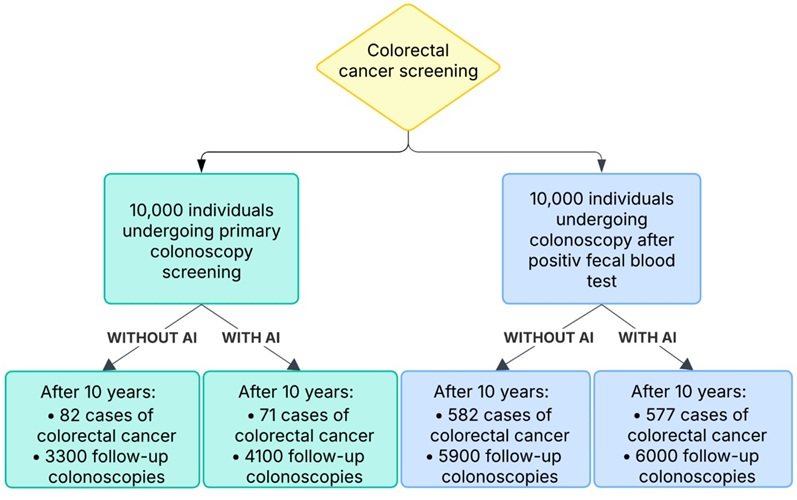AI-Assisted Colonoscopy Detects More Polyps but Has Modest Effect on Cancer Risk
|
By HospiMedica International staff writers Posted on 31 Mar 2025 |

Colorectal cancer is among the most common cancers in the Western world. Currently, screening is performed using a test that detects blood in the stool (FIT screening). If the test identifies a certain amount of blood, the patient is referred for a colonoscopy. During these colonoscopies, artificial intelligence (AI) is commonly used as an assistant to help identify polyps. However, the clinical benefits of AI in this context need to be documented, much like other diagnostic and treatment tools. AI applications in colonoscopy are among the most studied areas of clinical medicine. A recent systematic review conducted during the guideline development process analyzed 44 randomized studies involving over 30,000 patients. AI was found to detect more polyps, but long-term effects such as cancer incidence and mortality were not assessed. A new study has now revealed that AI use during colonoscopy increased polyp detection by approximately 8%, but had minimal impact on cancer risk.
This large microsimulation study, led by the University of Oslo (Oslo, Norway), aimed to explore whether AI could help reduce colorectal cancer incidence and mortality. The study evaluated the effects of AI on cancer occurrence, mortality, and potential drawbacks such as increased follow-up colonoscopies when AI is used in colorectal cancer screening. The researchers reviewed data from about 15 studies in addition to the systematic review. The results showed that AI’s use in colonoscopy had little to no clinically significant effect on colorectal cancer risk or mortality after screening. Specifically, AI reduced cancer risk over 10 years from 0.82% without AI to 0.71% with AI. For those undergoing colonoscopy after FIT screening, the risk decreased slightly from 5.82% to 5.77%. The study, published in BMJ Medicine, also found that AI use led to a 20% increase in follow-up colonoscopies over 10 years, due to the enhanced detection of polyps. This increase results in more examinations for individual patients and additional strain on healthcare systems. The study's findings suggest that while AI improves polyp detection and can reduce cancer risk, it must be considered alongside the drawbacks of increased follow-up examinations, as the effect on cancer risk is minimal.
“The project shows that while artificial intelligence can reduce cancer risk by improving the detection of polyps, it must be weighed against the drawbacks of increased follow-up burden. The risk of cancer, which is the most important for patients, is minimally affected,” said physician and Ph.D. candidate Natalie Halvorsen from the Clinical Effectiveness Research Group at UiO.
Related Links:
University of Oslo
Latest Critical Care News
- Novel Cannula Delivery System Enables Targeted Delivery of Imaging Agents and Drugs
- Ingestible Smart Capsule for Chemical Sensing in the Gut Moves Closer to Market
- Novel Intrabronchial Method Delivers Cell Therapies in Critically Ill Patients on External Lung Support
- Generative AI Technology Detects Heart Disease Earlier Than Conventional Methods
- Wearable Technology Predicts Cardiovascular Risk by Continuously Monitoring Heart Rate Recovery
- Wearable Health Monitoring Device Measures Gases Emitted from and Absorbed by Skin
- Groundbreaking Technology Rapidly Detects Airborne Influenza Viruses
- Handheld Device Could Transform Heart Disease Screening
- Flexible Semi-Autonomous Robot Could Deliver Medicine Inside Body

- Neurorestorative Treatment Strategies Hold Promise for Most Severe Forms of Epilepsy
- Gene Discovery Could Help Grow New Heart Arteries
- Study Discovers Invisible Transmission of Common Hospital-Associated Infection
- Non-Invasive Neuro-Ophthalmology Techniques Could Detect Brain Tumors Earlier
- Mass Manufactured Nanoparticles to Deliver Cancer Drugs Directly to Tumors
- World’s Smallest Pacemaker Fits Inside Syringe Tip

- AI-Powered, Internet-Connected Medical Devices to Revolutionize Healthcare, Finds Study
Channels
Surgical Techniques
view channel
Intravascular Imaging for Guiding Stent Implantation Ensures Safer Stenting Procedures
Patients diagnosed with coronary artery disease, which is caused by plaque accumulation within the arteries leading to chest pain, shortness of breath, and potential heart attacks, frequently undergo percutaneous... Read more
World's First AI Surgical Guidance Platform Allows Surgeons to Measure Success in Real-Time
Surgeons have always faced challenges in measuring their progress toward surgical goals during procedures. Traditionally, obtaining measurements required stepping out of the sterile environment to perform... Read morePatient Care
view channel
Portable Biosensor Platform to Reduce Hospital-Acquired Infections
Approximately 4 million patients in the European Union acquire healthcare-associated infections (HAIs) or nosocomial infections each year, with around 37,000 deaths directly resulting from these infections,... Read moreFirst-Of-Its-Kind Portable Germicidal Light Technology Disinfects High-Touch Clinical Surfaces in Seconds
Reducing healthcare-acquired infections (HAIs) remains a pressing issue within global healthcare systems. In the United States alone, 1.7 million patients contract HAIs annually, leading to approximately... Read more
Surgical Capacity Optimization Solution Helps Hospitals Boost OR Utilization
An innovative solution has the capability to transform surgical capacity utilization by targeting the root cause of surgical block time inefficiencies. Fujitsu Limited’s (Tokyo, Japan) Surgical Capacity... Read more
Game-Changing Innovation in Surgical Instrument Sterilization Significantly Improves OR Throughput
A groundbreaking innovation enables hospitals to significantly improve instrument processing time and throughput in operating rooms (ORs) and sterile processing departments. Turbett Surgical, Inc.... Read moreHealth IT
view channel
Printable Molecule-Selective Nanoparticles Enable Mass Production of Wearable Biosensors
The future of medicine is likely to focus on the personalization of healthcare—understanding exactly what an individual requires and delivering the appropriate combination of nutrients, metabolites, and... Read more
Smartwatches Could Detect Congestive Heart Failure
Diagnosing congestive heart failure (CHF) typically requires expensive and time-consuming imaging techniques like echocardiography, also known as cardiac ultrasound. Previously, detecting CHF by analyzing... Read moreBusiness
view channel
Expanded Collaboration to Transform OR Technology Through AI and Automation
The expansion of an existing collaboration between three leading companies aims to develop artificial intelligence (AI)-driven solutions for smart operating rooms with sophisticated monitoring and automation.... Read more

















